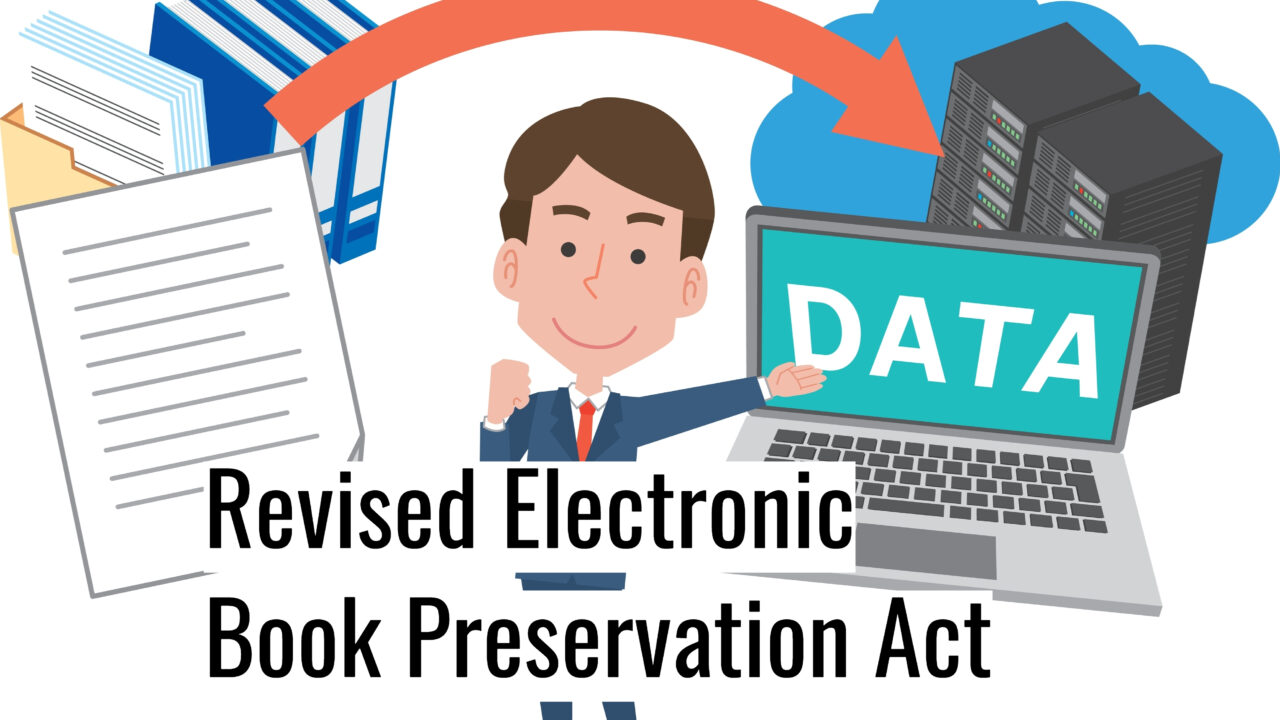🧭 Is Japan Finally Catching Up with Global Digital Standards?
The Electronic Book Preservation Act (EBPA) was revised in 2021 and came into effect on January 1, 2022. The updated law allows tax-related documents, which were traditionally required to be stored on paper, to be preserved digitally—under specific conditions.
Additionally, the law mandates the digital storage of transaction data exchanged electronically, with enforcement beginning January 1, 2024, after a one-year grace period.
📜 Background: The History of the EBPA
The EBPA was first enacted in 1998, during the early stages of internet adoption and the use of accounting software—but before smartphones or cloud-based systems became widespread.
❗ Challenges in the Old System:
- Required prior approval from the tax office for digital storage
- Bureaucratic procedures discouraged businesses from going paperless
- Many companies were reluctant to change traditional practices
🖋️ Like the continued use of seals and fax machines, paper records remained the norm in Japan
🔧 Key Reforms in the 2021 Revision
✅ 1. Elimination of Prior Approval Requirement
Before: Businesses had to apply for permission from the tax office to store records electronically.
Now: Prior approval is no longer necessary, reducing administrative burdens and encouraging digitization.
This change applies to a wide range of tax-related documents, including account books, ledgers, receipts, invoices, and other financial records that a business chooses to store electronically.
Importantly, electronic storage remains optional for paper-based transactions. If a company prefers to maintain physical copies for such documents, it may still do so—this system is not mandatory.
✅ By removing the prior approval step, the revision makes it easier for businesses—especially SMEs and sole proprietors—to voluntarily adopt digital recordkeeping at their own pace.
✅ 2. Relaxed Rules for Scanning and Time Stamping
Previously:
- Employees had to sign documents
- Scan them within 3 business days of receipt
- Apply a time stamp within that period
Now:
- No need to sign scanned documents
- Extended deadline for scanning and saving:
🗓️ Employees now have up to about 2 months and 7 business days after receiving a document to complete the scanning process
- Time stamping is no longer required if:
- The document is stored in a system that logs all changes, or
- The system does not allow modifications
These relaxed requirements apply to documents received in paper form—such as invoices, receipts, delivery statements, and contracts—that businesses choose to scan and save digitally in place of physical storage.
This procedure is also optional. Businesses may still store these documents in paper format if they prefer.
✳️ However, businesses that choose digital storage must comply with the revised standards, which now offer greater flexibility and a longer processing window.
📌 New Mandatory Requirements for Electronic Transactions
While the revision made digital storage easier, it also introduced mandatory requirements for certain types of data.
⚠️ Digital Preservation Is Now Obligatory
If invoices, receipts, or transaction records are received electronically—such as by email or download—they must be stored in electronic format.
❌ Printing and storing them on paper is no longer sufficient.
However, paper documents physically received can still be stored in paper form.
🛠️ How to Comply with Electronic Storage Requirements
To comply with the EBPA, businesses must adopt one of the following methods for storing digital documents:
- ✅ Apply a time stamp without delay
- ✅ Store files in a system that:
- Prevents unauthorized changes, or
- Records a history of all changes and deletions
- ✅ Implement internal rules to prevent unjustified modifications and operate accordingly
🔍 Making Files Searchable
To meet legal requirements, electronic data must be searchable by using at least one of the following approaches:
- A searchable system with filters by:
- Date
- Transaction amount
- Client name
- A summary list (e.g., Excel spreadsheet) linked to stored data
- File naming and folder organization that enables retrieval by fiscal year
🛠️ In 2023, Japan relaxed some of these rules for small businesses, recognizing their need for additional preparation time.
💣 Enforcement and the Real Purpose of the Revision
Although the official rationale is to boost productivity and modernize accounting through digitization, many believe that the true goal is to:
- 🔍 Improve tax audit efficiency
- 📊 Support the new Invoice System
🚨 Penalties for Non-Compliance
- If digital records are falsified, an additional 10% penalty may be applied on top of the standard heavy additional tax
- If a company fails to comply with digital storage requirements for electronic transactions, it could lose its blue tax return status
✅ What Businesses Should Do Now
Even if your company is small, it’s essential to begin preparing for full compliance.
📝 Action Checklist
- 🔍 Review current document handling practices
- 💬 Consult your tax advisor or CPA
- 💻 Adopt or upgrade digital storage and management systems
- 📁 Ensure stored files are organized and searchable
- 📄 Document internal policies for data integrity










